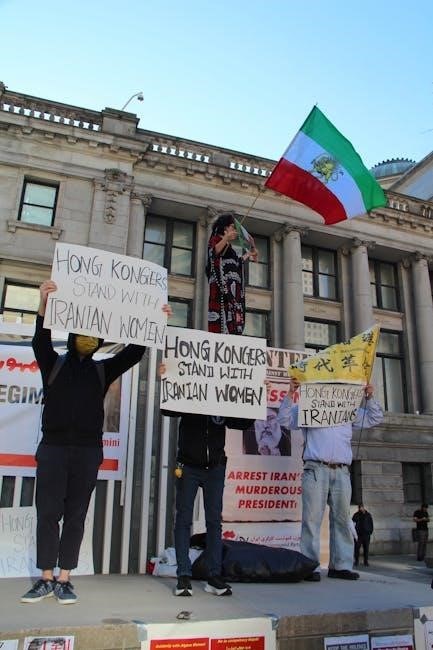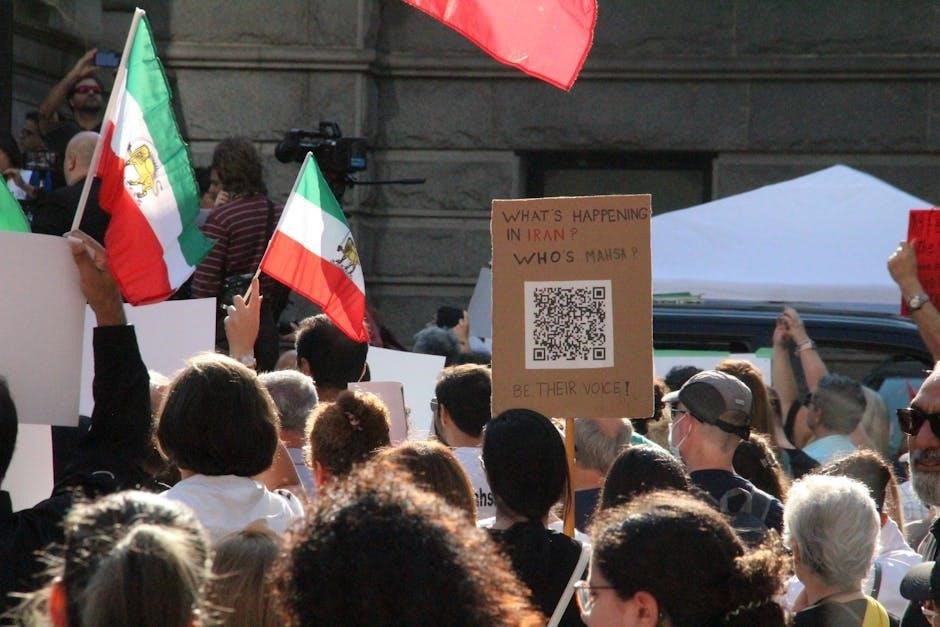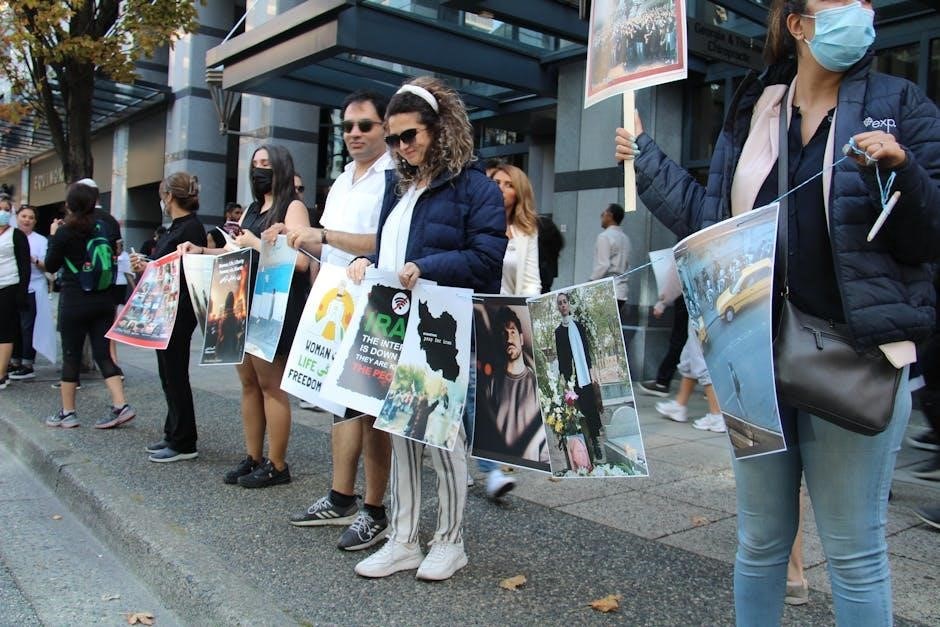The First Global Revolution is a pivotal report by the Club of Rome, addressing humanity’s common enemies like environmental degradation and economic inequality. It advocates for a shift from a military to a civil economy, emphasizing global unity and sustainable solutions to pressing challenges.
1.1. Overview of the First Global Revolution
The First Global Revolution, authored by Alexander King and Bertrand Schneider, is a seminal report by the Club of Rome. It examines the critical challenges facing humanity, including environmental degradation, economic instability, and social inequality. The report emphasizes the need for a paradigm shift from a military-driven economy to a civil one, fostering global unity and sustainable development. It highlights the urgency of collective action to address these interconnected issues, advocating for transformative changes to ensure a viable future for all. The document serves as a call to action for policymakers and global citizens alike.
1.2. Historical Context and Significance
The First Global Revolution emerges from a period of profound global transformation, marked by technological advancements and growing environmental awareness. Published in 1991, it builds on earlier Club of Rome reports, offering a comprehensive analysis of humanity’s challenges. The report is significant for its emphasis on interconnected global issues, urging a shift from militarism to civil-focused economies. It laid the groundwork for modern discussions on sustainability and global governance, making it a cornerstone of environmental and economic policy debates in the late 20th century and beyond.
1.3. Key Themes and Objectives
The First Global Revolution focuses on critical themes such as environmental degradation, economic mismanagement, and the need for global unity. It objectives include highlighting humanity’s common enemies, like pollution and resource depletion, and proposing solutions to these challenges. The report emphasizes the urgent need to transition from a military-driven economy to a civil-focused one, promoting sustainable development and international cooperation. By addressing these themes, the book aims to inspire collective action and foster a unified approach to solving global problems, ensuring a sustainable future for all humanity;

Background and Key Concepts
The Club of Rome’s report introduces the concept of a global revolution, focusing on humanity’s shared challenges and the need for systemic change to ensure sustainability.
2.1. The Club of Rome and Its Role
The Club of Rome, an independent organization, focuses on addressing global challenges through interdisciplinary analysis. Founded in 1968, it aims to foster understanding of complex global issues. In The First Global Revolution, the Club highlights humanity’s shared threats, advocating for systemic change and global cooperation. Its role is to provide a platform for dialogue, uniting experts to explore solutions for sustainable development and peace. The report emphasizes the need for a civil economy, shifting from military priorities to addressing environmental and social crises, thus influencing global policy and thought leadership.
2.2. The Concept of a “Global Revolution”
The concept of a “Global Revolution” refers to a transformative shift in human society, addressing systemic challenges like environmental degradation, economic inequality, and political instability. As outlined in The First Global Revolution, it emphasizes the need for collective action to overcome global crises. The report highlights humanity’s role as both the problem and the solution, advocating for a unified approach to achieve sustainable development and peace. This revolution envisions a world where cooperation replaces conflict, and innovation drives positive change, ensuring a prosperous future for all.
2.3. The Problematique of the Modern World
The “problematique” of the modern world, as outlined in The First Global Revolution, refers to a complex interplay of economic, environmental, and social challenges. It highlights issues like resource depletion, environmental degradation, and economic inequality, which are deeply interconnected. The report emphasizes that these problems cannot be addressed in isolation but require a holistic, global approach. It calls for systemic change to ensure sustainable development and equity, urging humanity to move beyond short-term thinking and adopt long-term solutions to secure a stable future for all nations and generations.

Historical Discussions and Relevance
The First Global Revolution highlights the historical evolution of global challenges, emphasizing how past conflicts and reforms shaped the need for systemic change and global cooperation.
3.1. Wars, Reforms, and Revolutions
The First Global Revolution is deeply rooted in historical discussions of wars, reforms, and revolutions, which have shaped humanity’s path. These events, from global conflicts to societal upheavals, highlight the necessity for systemic change. The transition from military to civil economies, as emphasized by the Club of Rome, reflects a shift toward addressing global challenges collectively. Historical revolutions have often catalyzed reforms, while wars have exposed the fragility of international systems, underscoring the need for unity and sustainable solutions to ensure a stable future.
3.2. The First Real World War and Global Transition
The First Real World War marked a turning point, exposing the weaknesses of global systems and sparking a transition toward collective action. This conflict highlighted the need for unity, as traditional adversaries dissolved, leaving governments and societies in a void; The Club of Rome’s report emphasizes the shift from military to civil economies, addressing environmental and economic challenges. This period of global upheaval underscored the urgency for systemic reforms, setting the stage for a new era of international cooperation and sustainable development to address humanity’s shared threats.
3.3. The Evolution of Global Challenges
Global challenges have evolved significantly, driven by interconnected economic, environmental, and societal shifts. The transition from localized issues to global crises, such as climate change and economic instability, underscores the need for collective action. Technological advancements and societal transformations have amplified these challenges, requiring adaptive solutions. The First Global Revolution highlights humanity’s shared threats, emphasizing the importance of addressing these interconnected problems holistically to ensure a sustainable and equitable future for all. Understanding this evolution is crucial for developing effective strategies to mitigate risks and foster global resilience.

The International Mismanagement of the World Economy
The international mismanagement of the world economy stems from poor global governance and lack of cooperation, leading to instability and inequality. Addressing these issues is crucial for sustainable development.
4.1. Economic Challenges and Global Instability
The world faces significant economic challenges, including instability driven by poor governance and lack of international cooperation. Environmental degradation, resource depletion, and social inequalities exacerbate these issues, threatening global stability. The transition from a military to a civil economy is essential to address these challenges, fostering sustainable development and reducing inequality. Short-term thinking and inadequate global policies hinder progress, emphasizing the need for coordinated action to ensure long-term economic stability and prosperity for all nations.
4.2. The Need for a Civil Economy
The transition from a military to a civil economy is critical to address global challenges. This shift involves reallocating resources from arms production to education, healthcare, and sustainable energy. Recognizing the disastrous short-term effects of military spending, the report emphasizes the need for long-term investments in human well-being and environmental sustainability. A civil economy prioritizes collective security and development, fostering global stability and reducing inequality. This approach aligns with the Club of Rome’s vision of a unified world addressing common threats through cooperative economic strategies.
4.3. The Transition from Military to Civil Economy
The shift from a military to a civil economy is essential for global stability. By reallocating resources from arms production to sustainable development, nations can address environmental degradation and inequality. This transition requires collective action, prioritizing education, healthcare, and renewable energy. The Club of Rome’s report underscores the need for cooperation to achieve this transformation, ensuring long-term security and prosperity. A civil economy fosters innovation and shared wealth, aligning with the vision of a unified world tackling common challenges collaboratively.

Environmental and Social Concerns
The First Global Revolution highlights the urgent need to address climate change and social inequities, advocating technological innovations for environmental sustainability and global equity;
5.1. Climate Change and Its Implications
Climate change is a central focus of the First Global Revolution, emphasizing its profound implications for global stability and human well-being. The report underscores the need for immediate action to mitigate environmental degradation, highlighting the interconnectedness of ecological health and economic systems. It warns that failure to address climate change could lead to irreversible damage, threatening future generations and necessitating a collective, global response to ensure sustainability and equity.
5.2. The Role of Technological Advancements
Technological advancements play a dual role in the First Global Revolution, offering solutions to global challenges while introducing new complexities. Innovations in renewable energy and sustainability hold promise for mitigating climate change, but their implementation requires equitable access and global cooperation. The report highlights the potential of technology to drive economic transformation and improve quality of life, yet warns against unchecked technological growth, emphasizing the need for ethical frameworks to ensure progress benefits all humanity and supports long-term planetary health.
5.3. Societal Transformations and Their Impact
Societal transformations are crucial for addressing global challenges, emphasizing shifts in values, governance, and economic systems. The First Global Revolution highlights the need for evolved social structures to ensure equity and sustainability. These changes necessitate collective action and cooperation, fostering global unity. While they offer opportunities for progress, they also face resistance from entrenched interests; Successful transformations can lead to a more equitable distribution of resources and a focus on long-term sustainability, ultimately shaping a resilient and harmonious global society.

The Vision for a Sustainable Future
The vision for a sustainable future emphasizes global unity, equitable resource distribution, and a shift to a civil economy. It advocates for sustainable practices, technological innovation, and collective responsibility to address environmental and social challenges, ensuring a harmonious and thriving world for future generations.
6.1. The Need for Global Unity
Global unity is essential to address the interconnected challenges facing humanity. The First Global Revolution highlights the need for collective action to transition from a military to a civil economy, ensuring sustainable development and equity. By fostering cooperation, nations can tackle environmental degradation, economic inequality, and social disparities. Unity enables a coordinated response to global crises, promoting peace and stability. It requires shared responsibility, mutual understanding, and a commitment to common goals, ensuring a harmonious and prosperous future for all; This collective effort is vital for overcoming the complex problems of the modern world.
6.2. Measures for Pursuing Necessary Changes
The report emphasizes the need for structural reforms to address global challenges. Transitioning from a military to a civil economy is crucial, alongside fostering sustainable development and environmental stewardship. International cooperation must be strengthened to implement policies that promote equity and resource efficiency. Education and awareness campaigns can empower individuals to contribute to change. Additionally, fostering innovation and technological advancements can provide solutions to pressing issues. These measures require collective action and a shared commitment to creating a more equitable and sustainable world for future generations.
6.3. The Role of Individual and Collective Responsibility

Both individual and collective responsibility are crucial for driving global change. Individuals must adopt sustainable practices and advocate for policies that promote equity and environmental protection. Communities and organizations should collaborate to raise awareness and implement local solutions. Governments and international bodies must lead by example, fostering cooperation and enforcing regulations. By combining individual actions with collective efforts, society can address global challenges effectively, ensuring a sustainable and equitable future for all. Shared responsibility is key to achieving lasting transformation and unity.

The Legacy of the First Global Revolution
The First Global Revolution has left a lasting impact, inspiring global policy changes and fostering discussions on sustainability and equity. Its ideas remain relevant today.
7.1. The Book’s Impact on Global Policy
The First Global Revolution significantly influenced global policy by highlighting critical issues like environmental degradation and economic inequality. It prompted international discussions on sustainability and equity, shaping agendas for organizations worldwide. The book’s emphasis on transitioning from a military to a civil economy inspired policy reforms aimed at reducing arms races and reallocating resources to social and environmental needs. Its insights remain foundational in addressing contemporary challenges, underscoring the importance of collective action for a sustainable future.
7.2. Reactions and Criticisms
The First Global Revolution received mixed reactions, with praise for its comprehensive analysis of global challenges and critiques for its perceived alarmist tone. Some policymakers and academics appreciated its emphasis on environmental and economic issues, while others argued it oversimplified complex problems. Critics noted the lack of detailed, actionable solutions, despite its call for systemic change. The book’s focus on humanity as its own enemy sparked debate, with some viewing it as a necessary wake-up call and others as overly pessimistic. Its impact on policy discussions remains significant, though its critiques highlight the need for nuanced approaches to global challenges.

7.3. The Book’s Relevance in the Modern Era
The First Global Revolution remains relevant today, as its themes of climate change, economic instability, and the need for global unity resonate strongly. The book’s emphasis on transitioning from a military to a civil economy aligns with contemporary discussions on sustainability and peace. Its warnings about humanity’s self-destructive tendencies are particularly poignant amid current environmental and social crises. While written decades ago, its call for collective action and systemic change continues to inspire modern policymakers and activists, making it a timeless resource for addressing global challenges.
The First Global Revolution underscores the urgency of addressing climate change, economic instability, and social inequality through global unity and sustainable solutions, remaining highly relevant today.

8.1. Summary of Key Points
The First Global Revolution highlights the critical need for humanity to address pressing challenges such as climate change, economic instability, and social inequality. The report emphasizes the importance of transitioning from a military to a civil economy and advocates for global unity to achieve sustainable solutions. It also underscores the role of individual and collective responsibility in driving necessary changes. The key points stress the interconnectedness of global issues and the urgent need for coordinated action to ensure a sustainable future for all.
8.2. The Ongoing Challenge of Global Unity
Achieving global unity remains a significant challenge, as nations struggle with conflicting interests, economic disparities, and political ideologies. The transition from a military to a civil economy requires unprecedented international cooperation, which is often hindered by historical tensions and competing priorities. Despite the urgency of global issues like climate change, societal transformations, and economic instability, fostering collective action remains elusive. The First Global Revolution underscores the need for a shared vision and collaborative efforts to address these challenges effectively and ensure a sustainable future for all humanity.
8.3. The Path Forward
The path forward requires a collective commitment to global unity, sustainable practices, and equitable solutions. Transitioning from a military to a civil economy is crucial, focusing on renewable energy and social welfare. Addressing environmental and economic challenges demands innovative policies and international cooperation. Education and awareness are key to fostering individual and collective responsibility. By prioritizing long-term stability over short-term gains, humanity can navigate the complexities of the 21st century and build a resilient, inclusive future. The vision of a sustainable world hinges on bold, unified action and a shared commitment to the well-being of all.

